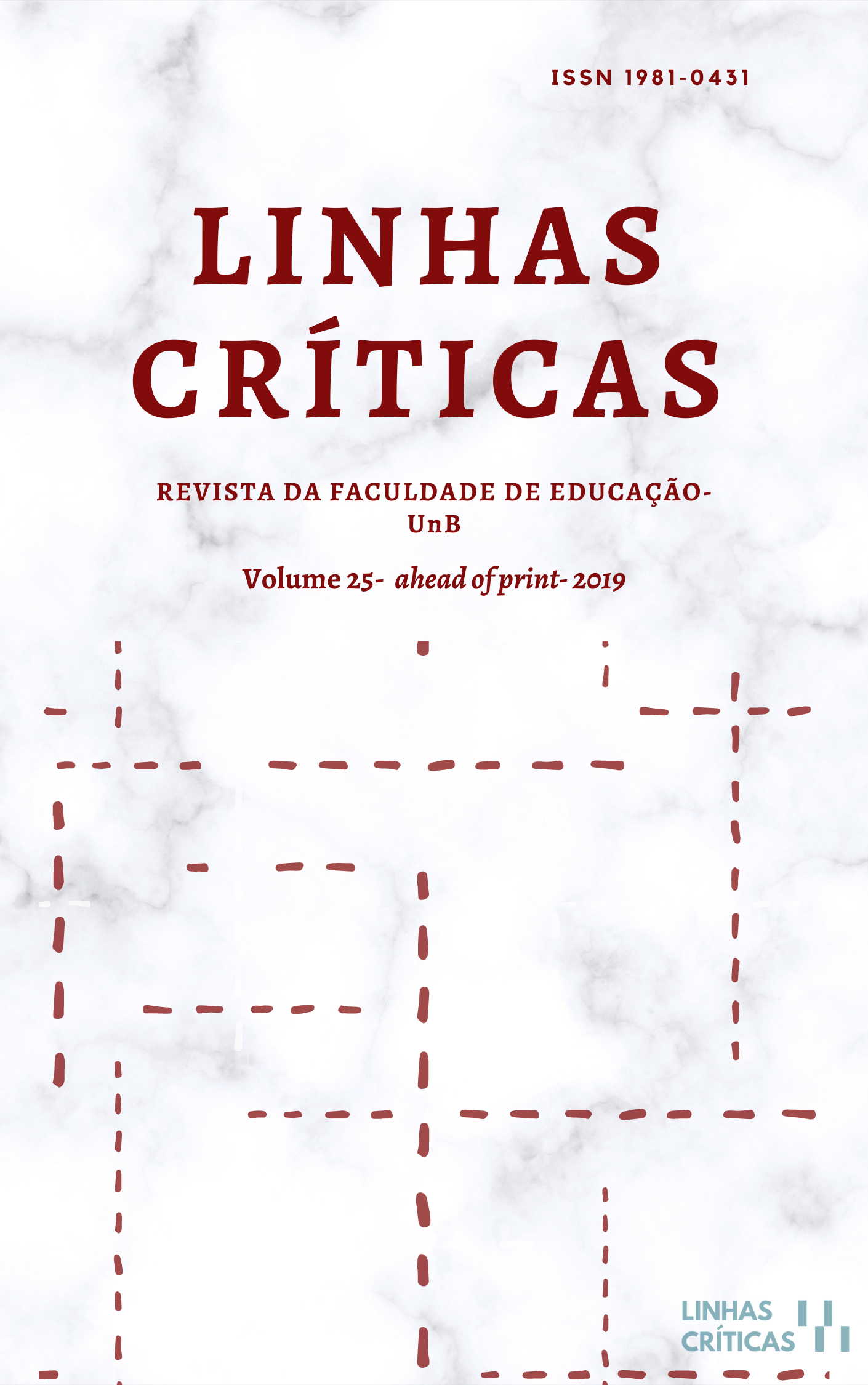Babies in the kindergarten collective group: meetings and provocations redirecting the pedagogy duties
DOI:
https://doi.org/10.26512/lc.v25.2019.22358Keywords:
Childhood school, Kindergarten, Babies, SpacesAbstract
Starting from the problem discussion of the (un) place of the babies in the kindergarten, the article has as goal discuss how the presence of a nursery group in the childhood school’s usual spaces in RS can affect pedagogy redirecting. The analysis revealed that the actions and relations of the babies at the different kindergarten’s spaces gives visibility to the pedagogy action and bring provocations about the way how the school is organized. It’s considered that use the kindergarten’s collective environment expand and get complex for the babies learning, increasing pedagogies that hold your specifies.
Downloads
References
Arendt, H. (2008). A condição humana. Rio de Janeiro: Forense Universitária.
Barbosa, M. C. S. (2006). Por amor e por força: rotinas na educação infantil. Porto Alegre: Artmed.
Barbosa, M. C. S. (2009). Práticas cotidianas na educação infantil–bases para a reflexão sobre as orientações curriculares. Brasília: MEC/UFRGS. Recuperado de http://portal.mec.gov.br/dmdocuments/relat_seb_praticas_cotidianas.pdf
Barbosa, M. C. S., & Richter, S. R. S. (2010). Os bebês interrogam o currículo: as múltiplas linguagens na creche. Educação (UFSM), 35(1), 85–96.
Brasil. (2009). Resolução no 5, de 17 de dezembro de 2009. Fixa as Diretrizes Curriculares Nacionais para a Educação Infantil. Brasília: MEC/SEB.
Brasil. (2006). Parâmetros básicos de infraestrutura para instituições de educação infantil. Brasília: MEC/SEB.
Freitas, M. C. (2007). Prefácio. In A. L. G. Faria (Org.), O coletivo infantil em creches e pré-escolas: falares e saberes (p. 7–14). São Paulo: Cortez.
Gobbato, C. (2011). Os bebês estão por todos os espaços: um estudo sobre a educação de bebês nos diferentes contextos de vida coletiva da escola infantil. (Dissertação, Mestrado em Educação) - Programa de Pós-Graduação em Educação, Universidade Federal do Rio Grande do Sul, Porto Alegre.
Gobbato, C., & Barbosa, M. C. S. (2017). A (dupla) invisibilidade dos bebês e das crianças bem pequenas na educação infantil: tão perto, tão longe. Humanidades & Inovação, 4(1). Recuperado de https://revista.unitins.br/index.php/humanidadeseinovacao/article/view/289
Goldschmied, E., & Jackson, S. (2006). Educação de 0 a 3 anos: o atendimento em creche. Porto Alegre: Artmed.
Mantovani, S. (2016). Prefazione. In C. Silva, E. Freschi, & S. Mantovani (Orgs.), Didattica e nido d’infanzia. Metodi e pratiche d’intervento educativo (p. 9–11). Parma: Edizioni Junior.
Mantovani, S., Braga, P., & Gambini, A. (2016). Incontrare i viventi: Esperienze scientifiche al Nido. In C. Silva, E. Freschi, & S. Mantovani (Orgs.), Didattica e nido d’infanzia. Metodi e pratiche d’intervento educativo (p. 59–70). Parma: Edizioni Junior.
Montandon, C. (2001). Sociologia da infância: balanço dos trabalhos em língua inglesa. Cadernos de Pesquisa, (112), 33–60.
Rogoff, B. (2005). A natureza cultural do desenvolvimento humano. Porto Alegre: Artmed.
Rosemberg, F. (2015a). A cidadania dos bebês e os direitos de pais e mães trabalhadoras. In D. Finco, M. A. Gobbi, & A. L. G. Faria (Orgs.), Creche e feminismo (p. 163– 183). Campinas: Leituras Críticas.
Rosemberg, F. (2015b). São Paulo: uma cidade hostil aos bebês. In A. Artes & S. Unbehaum (Orgs.), Escritos de Fúlvia Rosemberg (p. 210–214). São Paulo: Cortez.
Sacristán, J. (2005). As raízes culturais da ordem escolar em que ser aluno adquire sentido. In J. Sacristán (Org.), O aluno como invenção (p. 125–190). Porto Alegre: Artmed.
Sarmento, M. J. (2007). Visibilidade social e estudo da infância. In V. M. R. Vasconcellos & M. J. Sarmento (Orgs.), Infância (in)visível (p. 25–49). Araraquara: Junqueira & Ma rin.
Schmitt, R. V. (2008). Mas eu não falo a língua deles! As relações sociais de bebês num contexto de educação infantil (Dissertação, Metrado em Educação). Universidade Federal de Santa Catarina, Florianópolis.
Simiano, L. P. (2010). Meu quintal é maior que o mundo... Da configuração do espaço da creche à constituição de um lugar de bebês (Dissertação, Metrado em Educação). Programa de Pós-Graduação em Educação, Universidade do Sul de Santa Catarina, Tubarão.
Tura, M. de L. R. (2003). A observação do cotidiano escolar. In N. Zago, M. P. de Carvalho, & R. A. T. Videlo (Orgs.), Itinerários de pesquisa: perspectivas qualitativas em sociologia da educação (p. 183–204). Rio de Janeiro: DP&A.
Vasconcelos, T. (2007). A importância da educação na construção da cidadania. Saber (e) Educar, 12, 109–117.
Vincent, G., Lahire, B., & Thin, D. (2001). Sobre a história e a teoria da forma escolar. Educação em revista, 33, 7–47.
Zago, N. (2003). A entrevista e seu processo de construção: reflexões com base na experiência prática de pesquisa. Itinerários de pesquisa: perspectivas qualitativas em sociologia da educação. Rio de Janeiro: DP&A, 14, 9.
Published
How to Cite
Issue
Section
License
Copyright (c) 2019 Linhas Críticas

This work is licensed under a Creative Commons Attribution 4.0 International License.
Authors who publish in this journal agree to the following terms:
-Authors maintains the copyright and grants the journal the right of first publication, the work being simultaneously licensed under the Creative Commons Attribution License which allows the sharing of the work with recognition of the authorship of the work and initial publication in this journal.
- Authors are authorized to enter into additional contracts separately, for non-exclusive distribution of the version of the work published in this journal (eg publish in institutional repository or as a book chapter), with acknowledgment of authorship and initial publication in this journal.
-Authorers are allowed and encouraged to publish and distribute their work online (eg in institutional repositories or on their personal page) at any point before or during the editorial process, as this can generate productive changes as well as increase the impact and the citation of published work (See The Effect of Free Access).



